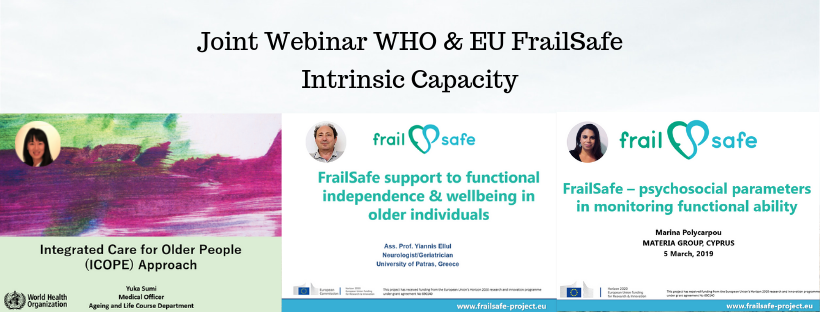On 5 March, FrailSafe organized a joint webinar with the WHO on “Intrinsic Capacities”. As Yuka Sumi, Medical Officer at the WHO’s Ageing and Life Course Department explained in her presentation, intrinsic capacity is the combination of individuals’ physical and mental capacities, whereas functional ability is the combination and interaction of intrinsic capacity with the environment a person inhabits. For example, a person has bad eyesight which is the intrinsic capacity, but with contract lenses or glasses, the functional ability for vision is fine.
To manage declines in intrinsic capacity with the objective of preventing care dependence in older age, the WHO has launched the integrated care for older people (ICOPE) approach. ICOPE reflects a community-based approach that will help to reorient health and social services towards a more person-centred and coordinated model of care that supports optimising functional ability for older people in six actions:
1. Improve musculoskeletal function, mobility and vitality
2. Maintain older adults’ capacity to see and hear
3. Prevent cognitive impairment & promote psychological well-being
4. Manage age-related conditions such as urinary incontinence
5. Prevent falls
6. Support caregivers
One part of implementing the ICOPE approach in the Member States is the guidance on person-centred assessment and pathways in primary care. This will be supported by the ICOPE app, currently in development, which will help health care providers to conduct the screening tests and more in-depth functional tests easily.
The following presentation of Prof. Yiannis Ellul, neurologist and geriatrician at the University of Patras, FrailSafe coordinator, picked up on the assessment of intrinsic capacity in relation to frailty. The FrailSafe system collects data in all five components that describe intrinsic capacity – and also frailty: locomotion, sensory, vitality, cognition and psychological. The big advantages of using FrailSafe compared to a conventional geriatric assessment are that patients are in their natural environment, multiple signals are evaluated, and big data analysis allows for objectivity in the extrapolation. The data fed into the system is analysed online in the case of falls, near falls and loss of orientation, as well as offline for other parameters. Based on the analysis of different factors, continuously or intermittently, recommendations are given, thus supporting the ICOPE guidance.
Marina Polycarpou, psychologist and gerontologist, CEO of Materia group and head of the Cyprus research team for FrailSafe, then focused on the specific psycho-social aspects of functional capacity and frailty in her presentation. She emphasized the interrelatedness of different factors and highlighted variables that are highly predictive of a person’s frailty status, for example the geriatric depression scale score or the number of telephone calls exchanged per week. Looking at different variables of frailty, it’s important to keep in mind that clinical assessment and self-reported well-being do not necessarily align, as some people deal better with frailty symptoms than others. In any instance, the focus should also be on what are people’s strengths and how to empower them – FrailSafe being a great tool to do so.
Following the three presentations, the webinar gave the opportunity for questions from the 54 participants. The discussions provided room for clarifications on different aspects of the ICOPE guidelines and the FrailSafe system, such as inclusion of elder abuse in ICOPE’s guidelines or the quality of the collected data. In the context of looking at the commonalities of the ICOPE approach and FrailSafe such as using new technology to monitor and provide data to the primary care physician, all speakers emphasized the importance of providing intervention as early as possible to prevent the onset of frailty and care-dependence in older age for as long as possible.
If you are looking for more detailed information, you can find a recording of the webinar here.

